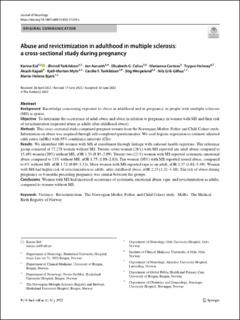Abuse and revictimization in adulthood in multiple sclerosis: a cross-sectional study during pregnancy
Eid, Karine; Torkildsen, Øivind; Aarseth, Jan Harald; Celius, Elisabeth Gulowsen; Cortese, Marianna; Holmøy, Trygve; Kapali, Akash; Myhr, Kjell-Morten; Torkildsen, Cecilie Fredvik; Wergeland, Stig; Gilhus, Nils Erik; Bjørk, Marte-Helene
Journal article, Peer reviewed
Published version

Åpne
Permanent lenke
https://hdl.handle.net/11250/3024259Utgivelsesdato
2022Metadata
Vis full innførselSamlinger
- Department of Clinical Medicine [2066]
- Registrations from Cristin [9791]
Sammendrag
Background: Knowledge concerning exposure to abuse in adulthood and in pregnancy in people with multiple sclerosis (MS) is sparse.
Objective: To determine the occurrence of adult abuse and abuse in relation to pregnancy in women with MS and their risk of revictimization (repeated abuse as adults after childhood abuse).
Methods: This cross-sectional study comprised pregnant women from the Norwegian Mother, Father and Child Cohort study. Information on abuse was acquired through self-completed questionnaires. We used logistic regression to estimate adjusted odds ratios (aORs) with 95% confidence intervals (CIs).
Results: We identified 106 women with MS at enrollment through linkage with national health registries. The reference group consisted of 77,278 women without MS. Twenty-seven women (26%) with MS reported any adult abuse compared to 15,491 women (20%) without MS, aOR 1.33 (0.85–2.09). Twenty-two (21%) women with MS reported systematic emotional abuse compared to 13% without MS, aOR 1.75 (1.08–2.83). Ten women (10%) with MS reported sexual abuse, compared to 6% without MS, aOR 1.72 (0.89–3.33). More women with MS reported rape as an adult, aOR 2.37 (1.02–5.49). Women with MS had higher risk of revictimization as adults, after childhood abuse, aOR 2.23 (1.22–4.10). The risk of abuse during pregnancy or 6 months preceding pregnancy was similar between the groups.
Conclusions: Women with MS had increased occurrence of systematic emotional abuse, rape, and revictimization as adults, compared to women without MS.
